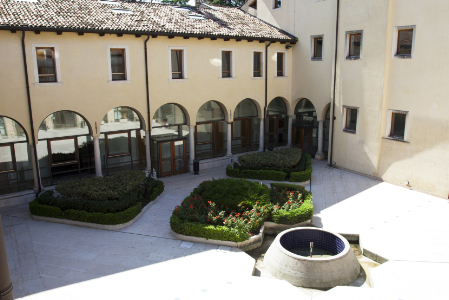Course not running

Lesson timetable
Go to lesson schedule
Learning outcomes
The course is aimed to provide students: - the ability to find the legal sources of the general part of criminal law and to compare them with the constitutional principles, with special attention to the hierarchical relationships between the national le-gal sources and the European Law; - the ability to analyze, understand and compare the legal norms and the conceptual categories and principles of the criminal law (legal good, act requirement, the wrongful result, rules of causation, mens rea, intention, negligence, attempt, complicity) - The ability to solve and deal with concrete problems concerning the main subjects of the criminal law both in written and oral form; the ability to use a specific and appropriate juridical language and to adopt the correcting methods of reasoning and argumentation; the ability to autonomously express opinions and verify their effects on the legal practice.
Syllabus
The course will be divided into the following parts:
1st Part: The evolution and the general characteristics of the criminal law
• The basis and limits of the punitive power of the State
• Comparison between the basic characteristics of the 1889 Italian Penal Code (so-called “Zanardelli Code”) and the 1930 Italian Penal Code (so-called “Rocco Code”)
• The influence of the Constitution of 1947 as well as the Constitutional Court case-law on the criminal justice system
2nd Part: The criminal legislation in a multilevel legal system
• Sources of criminal law
• The fundamental principle of legality (lex certa and lex scripta principles, non-retroactivity principle)
• The influence of the International and European Law on the Italian criminal law
3rd Part: The structure and the objective elements of the criminal offence
• The concept and function of the legal good (“bene giuridico”; “Rechtsgut”)
• The notion of “actus reus” (“fatto tipico”; “Tatbestand”)
• The active or omissive conduct
• The wrongful result and the rules of causation
4thPart: The unlawfulness of the act (“cause di giustificazione”; Rechtswidrigkeit”)
• Justification and excuse
5th Part: Subjective elements of the criminal offence (“mens rea”): culpability principle (“principio di colpevolezza”; “Schuldprinzip”)
• Intention (“dolo”)
• Negligence (“colpa”, “Fahrlässigkeit”)
• Preterintention and strict liability
• Ignorance and mistake of law
6th Part: The different forms and manifestations of the criminal offence
• The attempt
• Complicity and joint criminal enterprise
• Circumstances of the criminal offence
• Concurrence of offences
7th Part: The consequences of the criminal offence
• The “binary system” of criminal penalties and security measures
• The function and the general purposes of the criminal penalty
• The accessory penalties and the causes of extinction of the crime
TEACHING METHODS
Language of teaching for this course is Italian. All literature and auxiliary materials are also in Italian.
For students attending classes, the course will be mainly based on lectures and slides concerning the Italian Criminal Law. Workshops or seminars about specific topics or case studies could be organized during the course. The online registration to the University e-learning platform will provide students with a source of reference, bibliography, scientific papers and selected case-law.
The professor will provide support to students non-attending classes during the office hours (see the Law Department webpage). They may also register to the University e-learning platform and have access to a source of reference, bibliography, scientific papers and selected case-law.
Reference books
| Author |
Title |
Publisher |
Year |
ISBN |
Note |
| PALAZZO FRANCESCO |
Corso di Diritto penale
(Edizione 8)
|
Giappichelli |
2021
|
9788892138278 |
|
| DE VERO GIANCARLO |
Corso di Diritto penale
|
Giappichelli |
2020
|
978-88-921-3081-4 |
|
| PULITANO DOMENICO |
Diritto penale
(Edizione 9)
|
Giappichelli |
2021
|
9788892138223 |
|
| FIANDACA G., MUSCO E. |
Diritto penale. Parte generale
(Edizione 8)
|
Zanichelli |
2019
|
978-88-08-62031-6 |
|
| VIGANO F., MIEDICO M., TRINCHERA T. |
Studiare sui casi. Materiali integrativi per il corso di diritto penale
|
Giappichelli |
2020
|
9788892113848 |
|
Assessment methods and criteria
The final exam consists of an oral examination. Intermediate tests are possible, upon agreement with the professor.
The final exam aims at verifying:
• the level of achievement of the learning outcomes previously identified
• the linguistic accuracy
• the argumentative, reasoning and problem-solving skills
• the ability to connect systematically the knowledge achieved
Students attending classes and Erasmus students have the possibility to write a short paper on specific topics, upon agreement with the professor. The paper will be discussed during the oral examination and will be part of the final exam.
Students not-attending classes and ERASMUS students are kindly requested to contact the Professor at the beginning of the course, in order to agree on the exam’s program and the parts of reference books to study.
Grades are awarded on a scale from 18 to 30, where 30 is the highest grade and 18 is the lowest grade to pass the exam. In case of an excellent knowledge, a high level of linguistic accuracy and an argumentative, reasoning and problem-solving capacity the candidate may earn the highest grade with “cum laude” honor.







